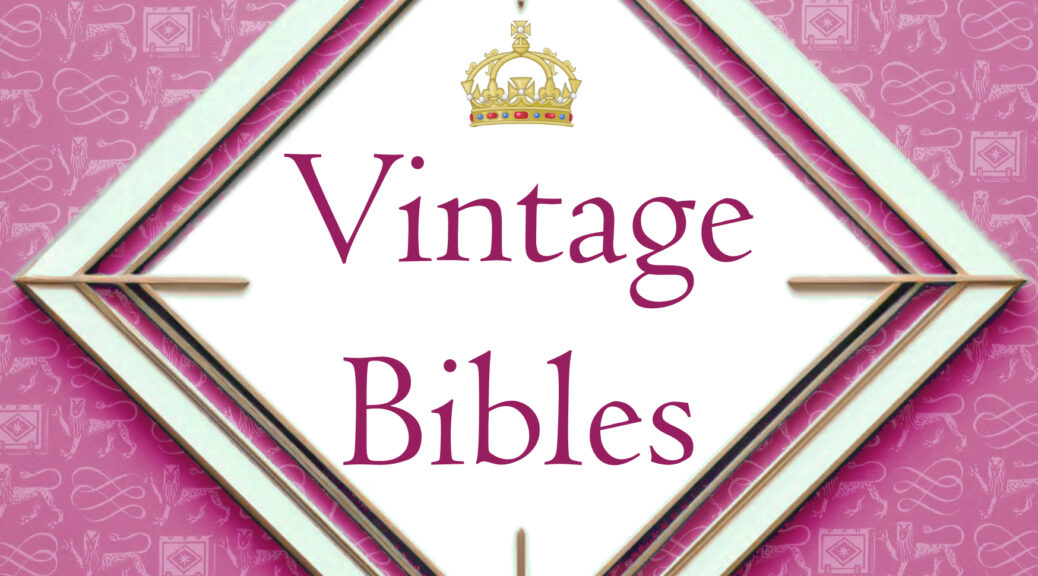The following is a series quotes from 18th and 19th century sources which tie the concepts of editorial and typographical accuracy with the word “pure” or “purity”. Further, that to ensure correctness requires some method of safeguarding and protection. Certain words have been bolded for ease of quick reference.
Report by Dr Benjamin Blayney, 1769
“whereby many errors that were found in former editions have been corrected, and the text reformed to such a standard of purity, as, it is presumed, is not to be met with in any other edition hitherto extant”.
Thomas Curtis’ THE EXISTING MONOPOLY, AN INADEQUATE PROTECTION, OF THE AUTHORISED VERSION OF SCRIPTURE (1831 Tract, 1833 Edition).
Letter from Thomas Turton, Cambridge University Press
“Great pains have been taken in this matter for many years; and although it did not seem expedient that your plan should be persevered in, you may rely upon it, that no effort will be wanting on the part of the Syndics, to secure a supply of Bibles as accurate as possible.”
1831–32 Select Committee Report (British Parliament)
“II. Effect of Monopoly on the Price, Accuracy, and Distribution of the Bible.
“1. Generally.
“The patents have not tended to improve the print and protect the accuracy of the text, … A watchful public, under the circumstances of a free trade, would be much more influential in preserving the pure text, than an unwatched monopoly, … A very great improvement has taken place of late years with respect to the accuracy in the printing of the Scriptures, both in the Universities and by the King’s printers”.
“The Church of Scotland acknowledges the inspired original alone as the standard, … A watchful public, under the circumstances of a free trade, would be much more influential in preserving the pure text than an unwatched monopoly, … There is no book of which it is so difficult to find a very correct edition as the English Bible, … Hardship under which the people of Scotland labour with respect to obtaining copies of the Oxford, Cambridge, and London Bibles”.
“There are very inaccurate editions printed both in England and Scotland; some of the most incorrect editions have been printed in Scotland, … Means which should be adopted for the satisfaction of the Church, to secure uniformity of text, supposing the trade in Bibles to be laid open in Scotland as that in other books, … The Bibles which were more accurately printed at the time of Charles the First and the Commonwealth appear to have been printed by other printers than the King’s printers, … There is no book of which it is so difficult to find a very correct edition as the English Bible”.
“Efforts of the Oxford University press to get their work perfect by keeping up moveable types, … Probable result of throwing the trade in Bibles and Testaments open, as regards price and the accuracy of the text”.
“Granting an exclusive privilege to print Bibles and Testaments does not insure greater accuracy, … A book like the Bible, which has undergone so many editions, if each had received the proper attention, might come as near perfection as possible; monopoly does not secure greater accuracy in the text, … If the printing of Bibles and Testaments were open to the trade, the public could be served not only with a greater variety of editions, but the price would be from 20 to 30 per cent. cheaper, … Probable result of throwing the trade in Bibles and Testaments open, as regards price, and the accuracy of the text, … If the monopoly were removed , and any person allowed to print the Bible, the errors would be fewer, … If the monopoly were removed, many of the errors would be prevented, … The patent has been exercised with a view to profit, and not solely with a view to protect the text”.
1837 REPORT from the SELECT COMMITTEE of the HOUSE OF COMMONS on KING’S PRINTERS PATENT (SCOTLAND); with the MINUTES of EVIDENCE, &c.
The Lord Advocate questioning The Rev. Adam Thompson
“… I think the interest of parties, who meant to print an edition of the Bible, would lead them to bestow all possible care upon it; it would require very great labour and minute attention, and it could not be done so well as by those who are accustomed to that sort of business.
“You think nothing would be gained, in point of accuracy and purity of the text, by any appointment of that nature? — I should think not.”
Mr Chambers questioning Mr Adam Black
“Have you any further observations to make with regard to securing the purity of the text? — Except that, in my opinion, the proposition of Dr Lee, as to employing professors of divinity, or persons appointed by the colleges to examine the text, would have no good effect.
“You think with
regard to that, that competition is the best safeguard? — Good practised
correctors of the press would be far better than all the professors in the
University.”
Mr Hume questioning Mr John Childe
“Then is there any means by which you could suggest the carrying out of the objects of Bible Societies better than that which you have stated? — There can be no plan of carrying out the objects of the Bible Societies so good as to permit them to procure their Bibles and Testaments in any way that they shall think best; seeing that the Bibles and Testaments which they shall publish meet all the objections which are raised to the trade being thrown open. I conceive that the British and Foreign Bible Society, the Society for Promoting Christian Knowledge, and the Religious Tract Society, would be a sufficient guarantee to persons of all denominations, saving those who claim a version for themselves, to satisfy them entirely of the purity of the text.
“Do you think there would be any danger that imperfect editions would be printed if societies had the privilege of doing that which you have now stated? That question was admirably answered by Mr Thomson, of Coldstream, the first day, I think, of the meeting of this Committee; the different denominations are so tenacious of their own principles that it is literally impossible for the Scriptures to be mutilated.”
The Lord Advocate questioning the Right Hon. Anthony R. Blake
“Has the free publication of the Scriptures ever given rise to any spurious or imperfect editions being sold in Ireland? — I never heard of any; I am speaking, of course, of the authorized version of the Scriptures; the translation of the Latin Vulgate, which is in use among the Roman Catholics, has nothing to do with it”.
The Lord Advocate questioning The Rev. Adam Thompson (again)
“Are you of opinion that the appointment of a censor, or any other regulations, might be attended with advantage in preserving the purity of the text of the Scriptures? — I think that the appointment of censors would be altogether unnecessary”.
1860 MINUTES OF EVIDENCE taken before SELECT COMMITTEE ON THE QUEEN’S PRINTERS’ PATENT
C. Knight
It is alleged that a pure and strictly accurate text can only be secured by the continuance of the monopoly; that if the trade were free, Bibles would be printed in a slovenly manner; that the text would be corrupted; and that the niceties of typography, now sedulously maintained, would not be adhered to.”
R. Potts
“Seventhly, the daily and weekly newspaper press, both in London and in the country, would doubtless lend its aid to secure our Bible pure and correct, as it does our civil and religious liberties. Here I would remark, that I have written to several newspapers, and I have received two letters, one from a London paper, the other from a Cambridge paper, both of which express a readiness to print any reviews or notices that any person might send to them for insertion of any editions of our authorised version.”
“The more important questions to which I have directed my attention are these: first, whether private printers who possess the necessary means and machinery for accurate printing should be debarred from printing the Scriptures when they are not debarred from printing any other books, either in English or in any other language; and, secondly, whether in case the Bible printing patents are discontinued, there are any securities sufficient for maintaining the authorized version of the Bible in its purity and correctness.”


